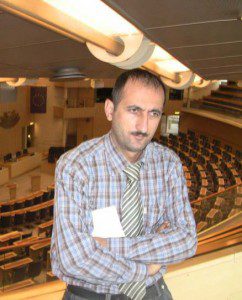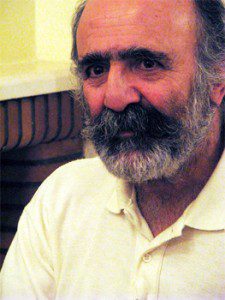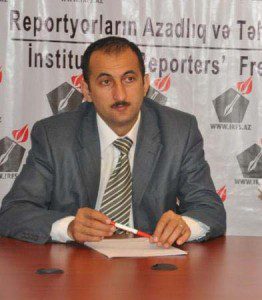London, capital of spin
 How does lobbying affect free speech? Index on Censorship’s Head of Advocacy Michael Harris explains
How does lobbying affect free speech? Index on Censorship’s Head of Advocacy Michael Harris explains
 How does lobbying affect free speech? Index on Censorship’s Head of Advocacy Michael Harris explains
How does lobbying affect free speech? Index on Censorship’s Head of Advocacy Michael Harris explains
 Azerbaijani journalist Idrak Abbasov wins the journalism award, which recognises investigative journalism of dogged determination across a range of media, including print, online, radio and television
Azerbaijani journalist Idrak Abbasov wins the journalism award, which recognises investigative journalism of dogged determination across a range of media, including print, online, radio and televisionFirst of all, I would like to thank Index on Censorship and all those present. I know that there are many people here today who devote their lives to the struggle for other people’s right to know the truth.
In Azerbaijan, where I have come from, telling the truth can cost a journalist their life. In countries such as Azerbaijan we journalists have to make a choice, and we choose the right to tell the truth.
For this right to tell the truth Elmar Guseinov gave his life in 2005. He knew he would not be forgiven, but he did not stop writing the truth.
I am not complaining. I made a conscious choice when I chose this profession, and I thank fate every day for my work.
Censorship, persecution, limited access to public information, arrests – the situation of the mass media in Azerbaijan is growing worse and their freedom is being curtailed year after year.
At the moment, nine journalists are under arrest on trumped-up charges of possessing drugs or weapons. In Azerbaijan, a request from a deputy of the ruling party is sufficient grounds for arresting the editor of a journal that is criticising the government, even in the absence of evidence. This is what happened to Evez Zeynalli.
In the town of Guba, four journalists were arrested without any charge whatsoever. Human rights activists are convinced that they were arrested for passing on to bloggers a video recording of an event that the censor had not wanted to see publicised.
Khadija Ismayilova, a journalist working for Radio Liberty, was blackmailed in an attempt to force her to stop her investigations into offshore companies owned by the President’s family. In 2009 Radio Liberty, the BBC and Voice of America were banned from local radio stations.
This is the price that my colleagues in Azerbaijan are paying for the right of the Azerbaijani people to know the truth about what is happening in their country. For the sake of this right we accept that our lives are in danger, as are the lives of our families. But the goal is worth it, since the right to truth is worth more than a life without truth.
Index’s most recent report Azerbaijan’s silenced voices is online now
Last night, the Hammersmith Apollo arena in London was invaded by thousands of Russian speakers who came to see the only UK tour date of the iconic St Petersburg rock band DDT.
The band, founded in 1980 by lead vocalist Yuri Shevchuk, has been at the forefront of Russian rock ever since.
Unlike most other Russian rock bands of the 1980s, they never traded their mother tongue for English: a difficult choice, but one that paid off in the long run. DDT also quickly acquired the status of dissidents, experiencing frequent rows with the authorities. Recently, Shevchuk’s name hit the headlines again for openly confronting Vladimir Putin in a heated debate and for partnering with Bono to save the Khimki forest from destruction.
DDT presented their new album “Inache” (“Otherwise”), surprising the public with unusual sounds and stunning visuals. In the final part of the concert, the performance shifted towards the lyrical ballads the band is famous for.
Opening the show, Shevchuk said: “Why is this show called “Otherwise”? Because many people in Russia want to live otherwise. Tonight, we will say goodbye to the glorious past and will crawl into the brutal reality of today, as we want Russia to have a brighter future”.
Index spoke to Shevchuk after the concert. The star gave a statement in support of the Sing for Democracy project, which is using the Eurovision contest to build momentum and call for human rights in Azerbaijan, the host country for the musical competition this year. Recently, two musicians were arrested after performing a concert in Baku: they have not been released yet, and according to insistent allegations they might have been tortured. In Russia, the case of punk band Pussy Riot is still firing up the public opinion. Shevchuk told Index:
“A musician is a very peculiar type of being. As in Azerbaijan, so in Russia, so in London — a musician is a being of freedom. A musician does not have any owners, except for God. You thus must not offend musicians, as they are the freest of all people. Because music is not generated from anywhere; it comes out of freedom, of inner freedom. Hence: hands off the musicians!”
 The author of China’s most widely read blog, 29-year-old Han Han has been called “the world’s most popular blogger”. He is also famed for being a cultural critic, race-car driver, actor and novelist. But despite his rock star status he has long been considered a thorn in the side of the Chinese government.
The author of China’s most widely read blog, 29-year-old Han Han has been called “the world’s most popular blogger”. He is also famed for being a cultural critic, race-car driver, actor and novelist. But despite his rock star status he has long been considered a thorn in the side of the Chinese government.
Though he has avoided ideological allegiances, Han Han recently sparked controversy with his essays, “On Democracy”, “On Revolution” and “Wanting Freedom”, which questioned where democracy really equals freedom and whether China will ever be capable of genuine reform.
Han Han has talked about suffering censorship: “Each time I do finish writing something and then can’t see it [after I post it, because it has been censored], I get despondent. And there are just so many government departments [to get past]. Even if the propaganda department and the General Administration of Press and Publications are fine with something, any department issued can wipe your essay away with a simple phone call.”
 Lucía Escobar’s story highlights the state of press freedom in Guatemala, where journalists are regularly intimidated by paramilitary groups. Escobar is a freelance columnist for El Periódico, a publication based in Guatemala City, and also operates an online radio station, Radio Ati.
Lucía Escobar’s story highlights the state of press freedom in Guatemala, where journalists are regularly intimidated by paramilitary groups. Escobar is a freelance columnist for El Periódico, a publication based in Guatemala City, and also operates an online radio station, Radio Ati.
On 19 October 2011, Escobar published a column alleging that a local mayor had turned a citizens’ group into a death squad that was socially cleansing “undesirables”, such as beggars and homeless people, and committed crimes including lynchings, torture, beatings and a kidnapping. In her column, Escobar blamed local government figures for being indifferent to the group’s activities.
Subsequent death threats forced Escobar to flee her home with her family and she has said she will remain in exile until the situation improves. No action has been taken by Guatemalan authorities, pointing to a worrying trend in Central America where those in power ignore attacks on journalists.
 Iranian journalist Kayvan Samimi has been instrumental in keeping dissent alive in the Islamic Republic.
Iranian journalist Kayvan Samimi has been instrumental in keeping dissent alive in the Islamic Republic.
Despite being imprisoned since 2009, Samimi has played a significant role in highlighting the attacks against those who attempt criticise the Iranian administration. In May 2011 Samimi co-authored a letter condemning the Iranian administration for its treatment of prisoners. The letter recorded the methods of torture used against the signatories.
He is serving a six-year prison sentence on charges of “propagating against the regime” and “assembly and collusion to disrupt national security” and has been banned from “political, social, and cultural activities” for 15 years, having been detained in the immediate aftermath of the 2009 presidential election.
 Idrak Abbasov is an Azerbaijani journalist whose investigative work has put his life in danger. Abbasov reports for newspaper Ayna-Zerkalo, contributes to the Institute for War & Peace Reporting website, and he is one of the founding members of Azerbaijan’s Institute for Reporters’ Freedom and Safety (IRFS) .
Idrak Abbasov is an Azerbaijani journalist whose investigative work has put his life in danger. Abbasov reports for newspaper Ayna-Zerkalo, contributes to the Institute for War & Peace Reporting website, and he is one of the founding members of Azerbaijan’s Institute for Reporters’ Freedom and Safety (IRFS) .
On 9 September 2011, after Abbasov investigated the activities of a local oil company, the State Oil Company of Azerbaijan (SOCAR) sent bulldozers to his family’s home. SOCAR claimed ownership of the site as part of a project to develop local oil resources with Global Energy Azerbaijan Ltd. His parents and brother were hospitalised after being attacked by the company’s security service during the incident.
It is believed that bulldozers targeted the journalist’s home because of his work monitoring human rights. The violence, threats and harassment of Abbasov and his family continued when his parents were again attacked at their home. One assailant reportedly said: “Tell Idrak to get smarter, or we will cut off his ears.”